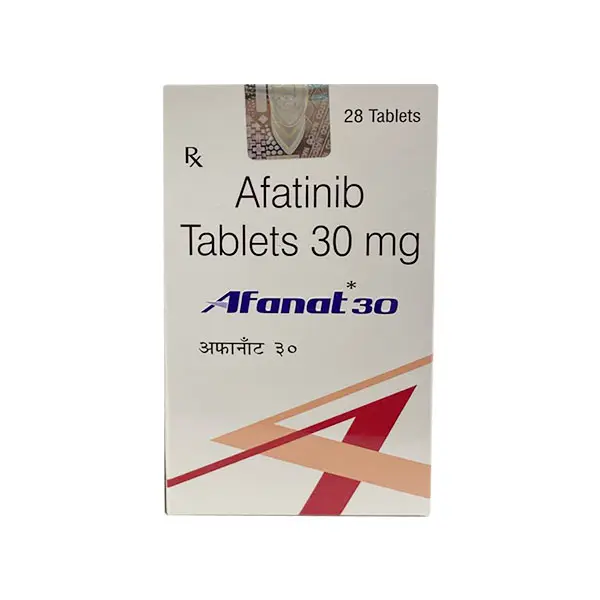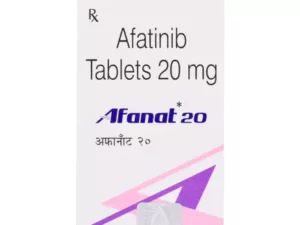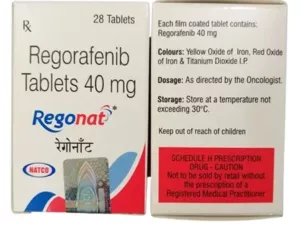Afatinib 30 mg Tablet: Full Guide to Uses, Dosage, Side Effects & Warnings
✅ What is Afatinib 30 mg Used For?
Afatinib 30 mg is a prescription cancer medication used primarily to treat:
- Non-Small Cell Lung Cancer (NSCLC):
- Specifically used in patients with EGFR (epidermal growth factor receptor) mutation-positive NSCLC.
- Suitable for patients with locally advanced or metastatic disease.
- Recurrent or Metastatic Squamous Cell Carcinoma of the Head and Neck (SCCHN):
- Administered when the cancer progresses after platinum-based chemotherapy.
💊 Dosage and Administration
Typical Dose:
- Afatinib 30 mg is often used when a patient cannot tolerate the standard 40 mg dose due to side effects.
- It can also be the initial dose in patients with poor health status or other risk factors.
Administration Guidelines:
- Take one tablet once daily, at the same time each day.
- Should be taken at least 1 hour before or 2 hours after a meal.
- Swallow the tablet whole with water; do not crush or chew.
Dose Adjustments:
- Dose may be reduced to 20 mg or increased to 40 mg depending on patient tolerance and side effects.
- Treatment is usually continued until disease progression or unacceptable toxicity.
⚠️ Warnings and Precautions
Monitor and Report the Following:
- Diarrhea:
- Very common and can become severe or life-threatening if not managed promptly.
- Antidiarrheal agents (e.g., loperamide) should be started at the first sign of loose stools.
- Skin Reactions:
- Acne-like rash, dry skin, and itching are common.
- These may require topical or systemic treatment and dose adjustment.
- Hepatotoxicity:
- Monitor liver function tests periodically, especially in patients with preexisting liver conditions.
- Interstitial Lung Disease (ILD):
- Although rare, ILD is a serious and potentially fatal side effect.
- Discontinue immediately if ILD is suspected (symptoms include shortness of breath, dry cough, fever).
- Eye Disorders:
- Dry eye, conjunctivitis, and keratitis may occur.
- Seek ophthalmologic consultation if symptoms worsen.
- Cardiac Risk:
- Afatinib may cause QT prolongation or other cardiac arrhythmias in rare cases.
- Pregnancy Risk:
- Afatinib is teratogenic. Use effective contraception during treatment and for at least 2 weeks after the last dose.
❌ Contraindications
- Hypersensitivity to Afatinib or any ingredient in the formulation.
- Should not be used during pregnancy or breastfeeding.
🔄 Drug Interactions
Afatinib is not metabolized via the CYP450 pathway, but it can still interact with:
- P-glycoprotein (P-gp) inhibitors/inducers:
- Inhibitors (e.g., ritonavir, ketoconazole) may increase Afatinib levels.
- Inducers (e.g., rifampicin, carbamazepine) may reduce its effectiveness.
- Antacids:
- May affect Afatinib absorption. Separate doses by several hours.
- Other cancer therapies:
- Caution when combining with other chemotherapeutics or radiation therapy.
🤰 Use in Pregnancy and Lactation
- Pregnancy: Category D – positive evidence of fetal risk.
- Lactation: Unknown if Afatinib is excreted in human milk. Discontinue nursing or the drug based on risk-benefit assessment.
🔬 Monitoring Parameters
- Liver function tests (ALT, AST, bilirubin)
- Renal function
- Skin and gastrointestinal toxicity
- Respiratory symptoms (ILD monitoring)
- ECG (for QT prolongation in high-risk patients)
⚠️ Side Effects
Common Side Effects:
- Diarrhea
- Rash and skin irritation
- Stomatitis (mouth sores)
- Dry skin
- Paronychia (nail inflammation)
- Nausea, vomiting
- FatigueFatigue
Serious Side Effects:
- Interstitial lung disease (ILD)
- Liver toxicity
- Severe dehydration from diarrhea
- Eye problems (keratitis, ulceration)
- Cardiac arrhythmias
🧊 Storage
- Store at 15°C to 30°C (59°F to 86°F)
- Protect from moisture and heat
- Keep out of reach of children








Avery (verified owner) –
Helped me recover faster from viral infections, amazing product!
Liam (verified owner) –
Great for daily immune defense, feeling stronger and healthier.